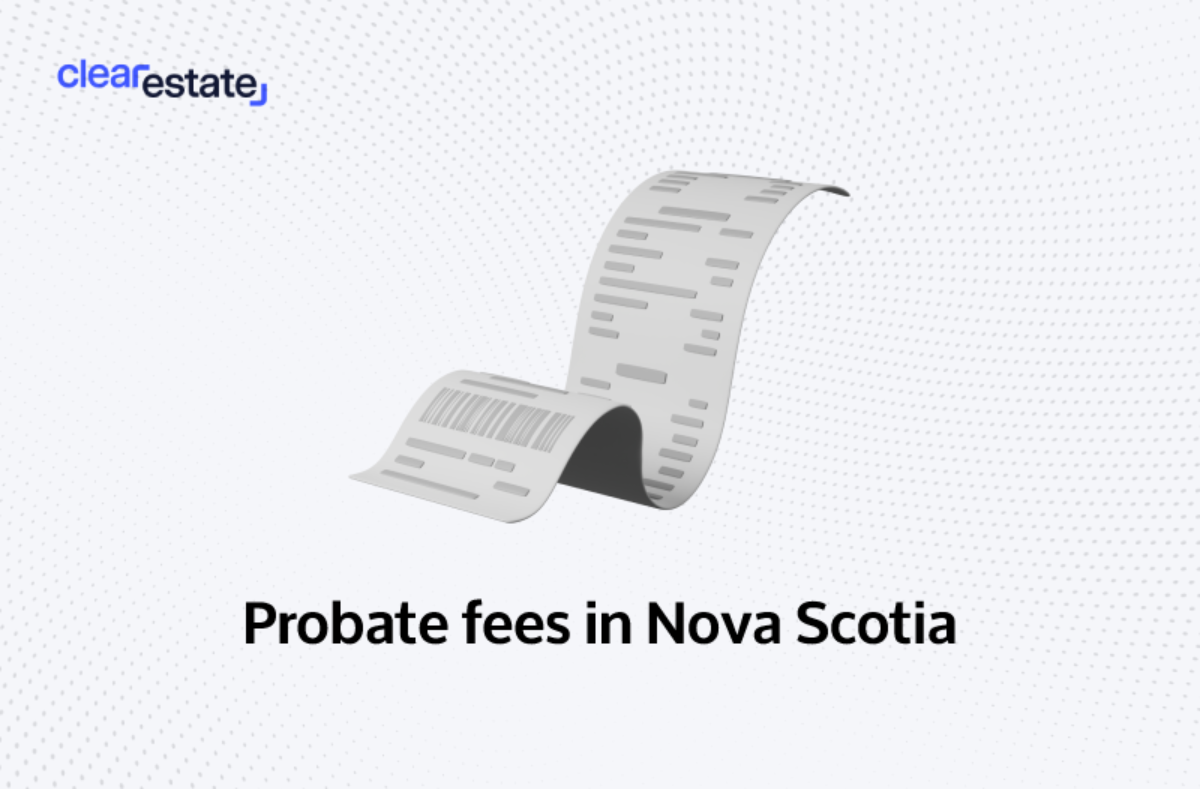Estate Settlement
Dec 04, 2024
How Do Executors Mail Inheritance Checks?
Find out how inheritance checks are mailed, including security measures and what to do if there are delays in receiving them.
Discover Nova Scotia's Probate Tax: Rates Up to 1.6% on Estates. Get a Full Breakdown on Fees, Payment Times, and Who Pays. Read on to learn more.


Governed by Section 87(2) of the Nova Scotia Probate Act, probate fees are levied on estates to cover the costs associated with the legal validation of a will and the administration of the estate.
In Nova Scotia, these fees are applied through a tiered structure and apply to all assets passing through a will, a trust under a will, or intestacy (when there is no will)
Here is the detailed breakdown of the probate fee:
Probate fees in Nova Scotia follow a tiered payment structure outlined in Section 87(2) of the Probate Act, and is as follows:
According to the Government of Nova Scotia, the estate value is the sum of the gross value of personal property and the net value of land located in Nova Scotia. Let's break down this calculation process in detail.
The first step involves assessing the value of any land owned by the deceased. This could be the fair market value or the most recent tax assessment.
From this value, subtract any mortgages, secured lines of credit, or recorded judgments.
(Fair market value of real property/land - mortgages/secured lines of credit = value of land)
Land owned in Joint Tenancy does not form part of the estate, as it transfers to the other owner(s) upon death.
For land held as Tenant in Common, include only the deceased’s share in the valuation, typically divided equally unless specified differently in the deeds.
Money:
Gather recent bank statements to find the balance of any accounts. Funds in accounts with a named beneficiary, not passing through the estate, should be excluded.
If exact amounts are unknown, estimate the value, and then update it after being appointed as the personal representative and accessing bank records.
Personal Items:
Estimate the value of personal belongings such as clothing, jewelry, household items, art, furniture, and electronics.
Items jointly owned, particularly with a spouse, should be excluded. A general estimate for personal items, especially if most belongings remain with a surviving spouse, is acceptable.
Vehicles:
Include all vehicles (cars, trucks, motorcycles, ATVs, watercraft, trailers, RVs) in the personal property category.
The total estate value is the sum of the gross value of personal property plus the net value of the land.
(Sum of gross value of personal property + net value of land = estate value for probate)
There may be cases where the actual value of the estate turns out to be different from the initial estimate:
To better help you with your calculations, enter the estate value for probate and we'll provide you with an accurate estimation of the probate fee the estate will face.
Navigating probate fees in Nova Scotia doesn't have to be a challenging journey. Our article sheds light on how these fees are determined, guiding you through the complexities of estate valuation, including both personal property and real estate within the province.
Whether your estate is modest or substantial, understanding the fee structure is crucial. From the basic fee for smaller estates to the detailed calculations for larger ones, we've covered everything you need to know.
But understanding probate fees is just the first step. The real challenge lies in managing these fees effectively as part of your estate planning. That's where our expertise comes in. With a deep understanding of Nova Scotia's probate process, our team is ready to provide you with tailored advice and strategies to navigate these waters smoothly.
Don't let the details of probate fees add to the stress of estate planning. Book a free consultation with our probate experts today and take the first step towards a hassle-free experience. Let us guide you with the expertise and care your estate deserves.
Managing the probate fee is a key responsibility of the estate's personal representative - usually the executor named in the will, or an administrator if there's no will. This person juggles various financial duties for the estate, and ensuring the probate fee is covered is one of them.
The probate fee is paid when probate or administration is granted. The fee is covered from the estate's assets and is crucial for the estate's processing and official validation by the probate court. Aligning this payment with the submission of necessary probate documents, like the estate inventory, is essential.
The probate fees are directed to the Attorney General and Minister of Justice for Nova Scotia's benefit. This process integrates estate administration into the broader provincial legal and governance system.
Once this tax is paid, the registrar rolls out several vital services for efficiently managing the estate. These include examining the estate's accounts, validating affidavits, filing key documents, and issuing orders for distributing the estate. It's all about ensuring everything is in order and properly handled.
 Simplify Probate Today
Simplify Probate Today
Get expert guidance from our probate specialists who've helped 10,000+ families.
Book a free consultation today